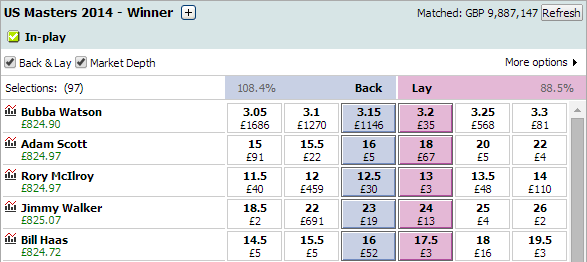Trading the US Masters Golf
I like the US Masters, mainly because it’s the only major played on the same course each year. This means you can collect a ton of stats on how the course plays. This gives me a good guide as to when to trade in and out of a position. You can do this on most courses, but because the Masters is at the same location every year it is much more predictable.
If you are a golf player, when you step up to the first tee you will already know which are the hardest and easiest holes thanks to the stroke index. When trading however, knowing the hardest holes isn’t sufficient; you need to know what impact each hole is likely to have on the score. Augusta gives us this chance.
How the course plays
Laying shorter priced players ahead of a trickier part of the course or backing bigger prices approaching easier holes can be a good strategy.
The most likely hole to drop a shot on is the 11th but variance to par, one of my main metrics, means that a dropped shot is quite likely to occur in bunches. The most expensive three holes over the course are holes 10-12 where on average there is a nearly a 28% chance of dropping a shot.
Players tend to pick up shots on the par fives so holes 13-15 are where you can pick up a shot. There is a average 40% chance you will pick up a shot on these holes. Players are most likely to eagle the 13th but two holes later is another chance. The last three holes are testing and dropped shots are likely here.
In the graph below you can see we have cluster the holes into groups of three holes and used a bit of maths to highlight the chance of dropping a shot at any of those three. Holes 10-12 show the highest chance of dropping a shot, 13-15 the lowest.
The weather looks potentially unsettled for the tournament this week and that will make for far more mistakes and cause problems for players who are used to good weather. European Tour players are used to playing in tough conditions, whereas a lot of US tour players are not. It’s notoriously tricky here, so a slice of luck will always be welcome. But the chances of a bit of bad luck will increase a lot if the conditions are not favourable.
Previous years
In 2014 Rory McIlroy was sent off favourite at [11.5] but had slipped to [110.0] by the cut. Eventual winner and former green jacket holder Bubba Watson was three shots in the lead and trading at only [3.0] by the cut. McIlroy went from [36.0] to [7.0] in 2011 before losing and just [3.55] from an SP of [8.0] in 2012. In 2013 he was set off at [15.5] and reached [6.2].
Tiger Woods didn’t play last year so we have to step back to 2013 to look at him. Tiger reached a low of [2.12] that year and lost. Adam Scott, the eventual winner was [18.5] at the cut, you could have laid six shorter priced players successfully in 2013.
Some strategies
In 2012, eventual winner Watson was [14.5] at the cut with three shorter prices above him. Second round contenders within five of the leader produce a winner 82% of the time and that will have risen to 94% by the end of the the third round.
Therefore ‘dutching’ the front of the field at the cut or at the start of round three is very likely to find a winner. When dutching using Bet Angel you nominate how much you want to win and select a range of players you want to win.
Some of how the Masters plays out this week will very much depend on the weather, which we don’t know for sure just yet. If it’s consistent then stick with the leaders later in the tournament. If it’s not, then start laying them. A lead of a few shots will get more valuable with each hole played.
So it’s best to stick with opposing players who have a slender lead to lose on a harder part of the course. Always bear in mind the tougher and easier holes and you will put yourself in a good position to trade out for a profit.
![]()
Category: Golf, Trading strategies







